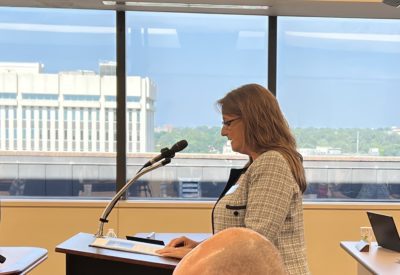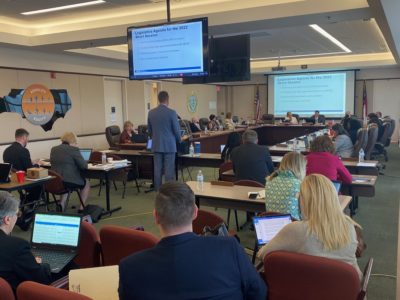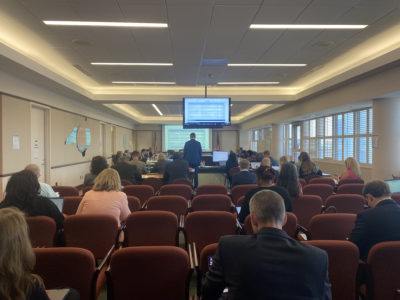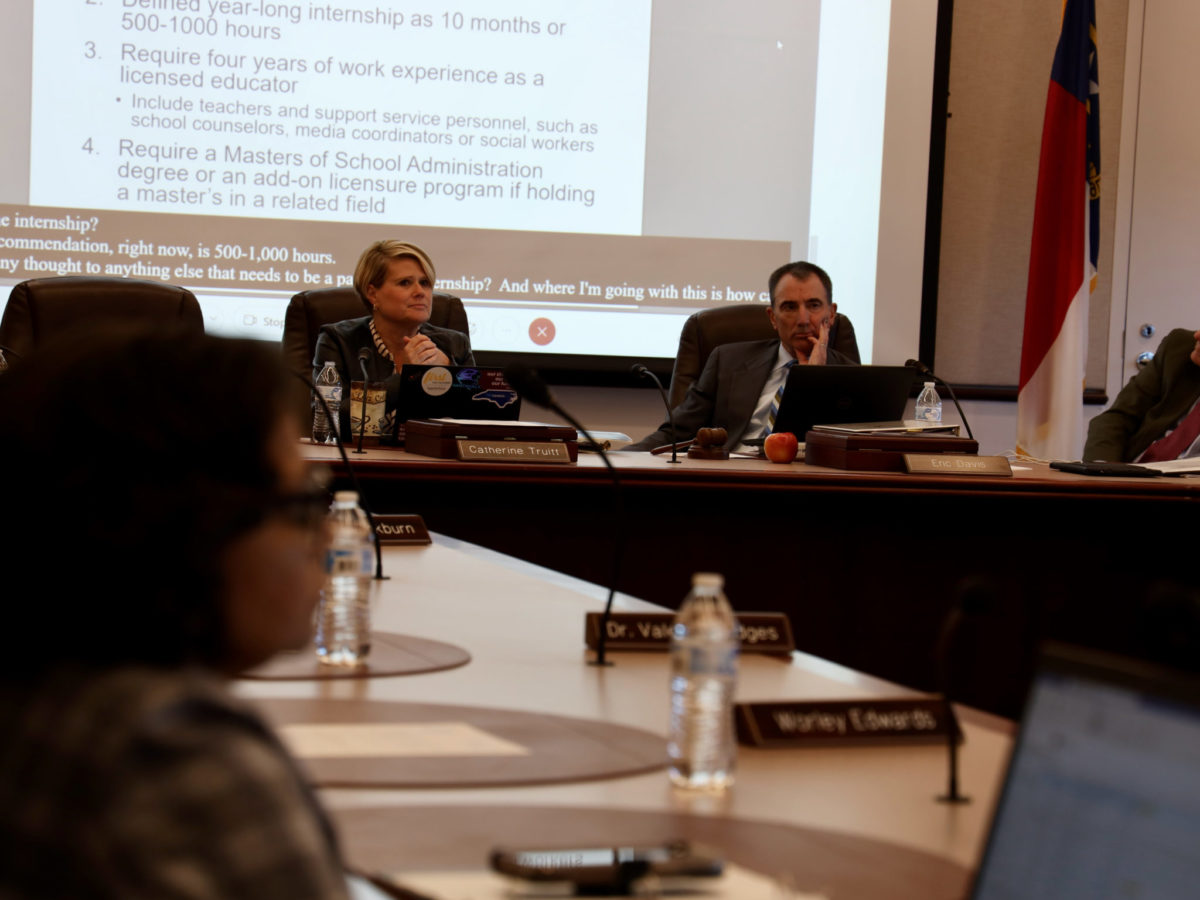
The State Board of Education and a legislative committee separately took up a number of important education topics this week, including the state of student reading comprehension and the funding of special education. The Board met Wednesday and Thursday. The Joint Legislative Education Oversight Committee met Wednesday. Here’s a wrap up of what you might have missed in education this week.
State Board of Education
Reading Proficiency
Students in grades 1-3 continue to lag behind students pre-pandemic in reading proficiency.
The Board heard a presentation on data on how students fared in reading in the 2021-22 school year. Students performed better than they did the last year but still have a ways to go before getting back to where they were before the pandemic temporarily closed down schools and moved instruction online.

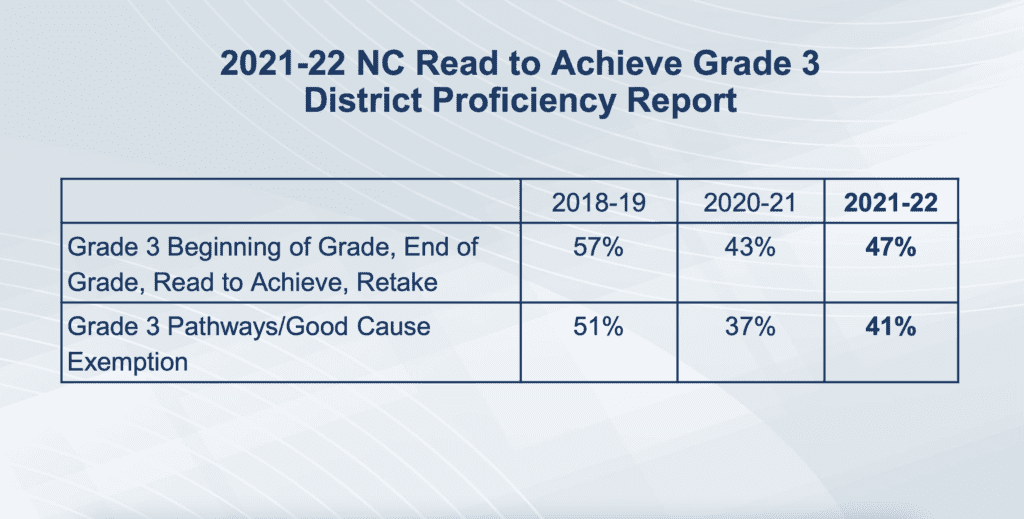
Earlier in the presentation, the Board heard, however, that students in grades K-2 were doing better than the rest of the country when it comes to literacy growth as measured by the Amplify DIBELS 8 Formative Reading Diagnostic Assessment.
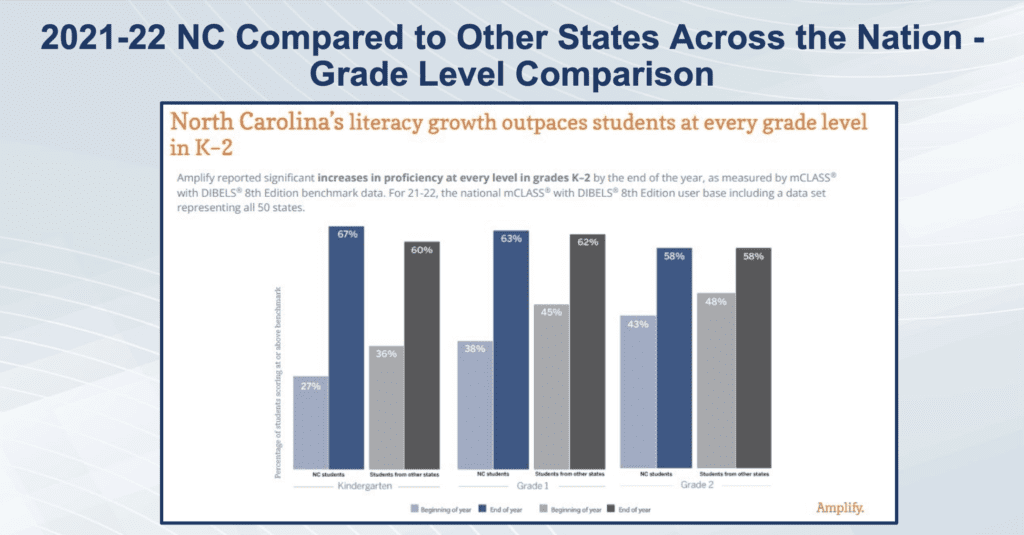
The Board also heard some good news when it comes to NC Pre-K end-of-year proficiency scores.
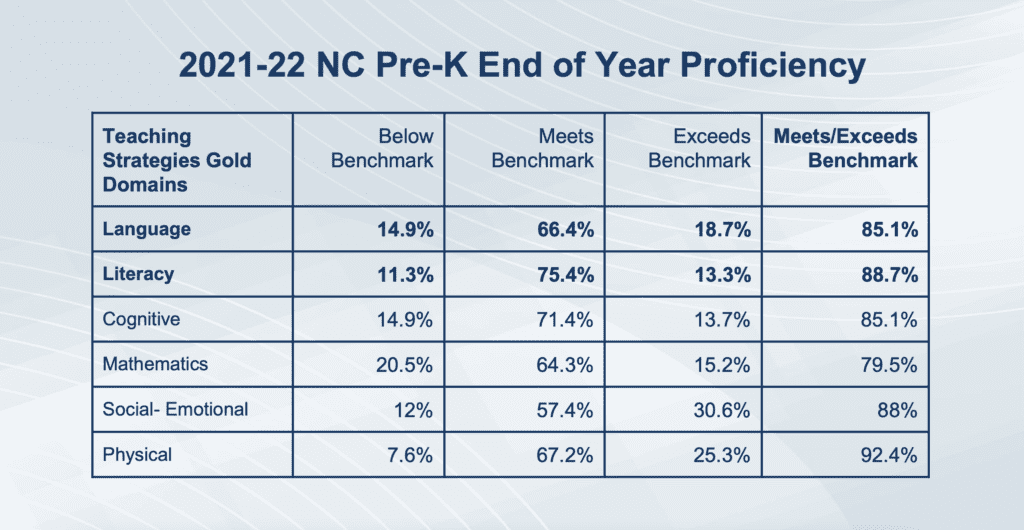
But there were some caveats to that good news, including that the process of measurement “does not adequately assess discrete early literacy skills supported by the Science of Reading,” according to a staff presentation.
This data was compiled into a report that will go the lawmakers. Read that report here.
Virtual Charter Schools
Board members also heard data on the state’s two virtual charter schools, which have had “D” letter grades every year of their existence even as their enrollment numbers have continued to grow.
The two charter schools are serving as a pilot program, though the duration of that pilot program has been extended by lawmakers. They were initially supposed to run only through the 2018-19 school year. Before 2018-19, lawmakers granted an extension of the pilot until the 2024-25 school year.
The enrollment of the schools is capped at 2,592, though the Board is allowed to waive that cap. The schools were also allowed some increases in enrollment above the cap by lawmakers during the worst of the COVID-19 pandemic. However, those allowances were temporary, and the previous cap was supposed to go back into place for 2022-23.
NC Cyber Academy currently has 2,595 students enrolled up from 1,353 when it started.
NC Virtual Academy went from 1,283 to 3,116.
Both schools are on the state’s low-performing list and have been for years.
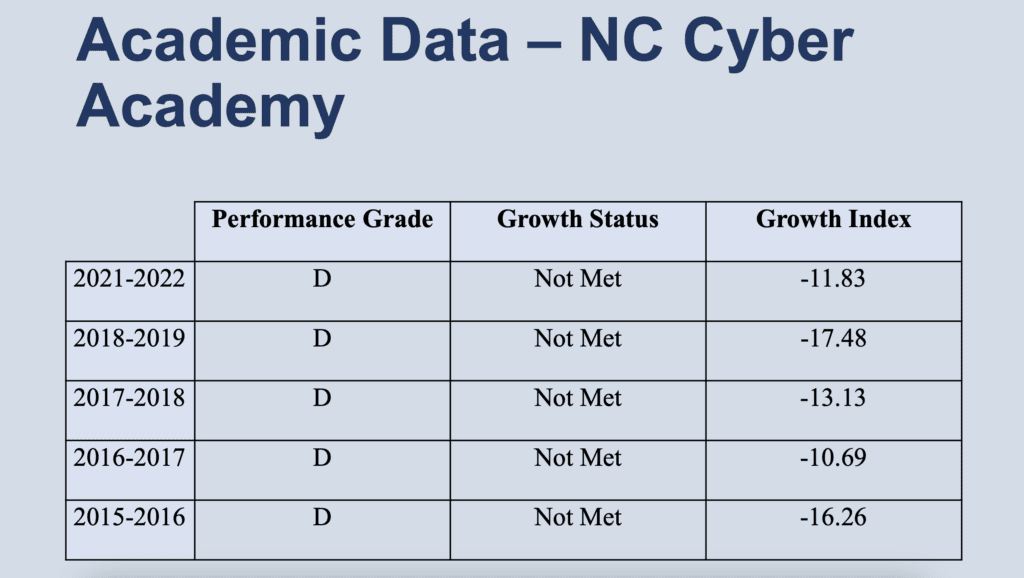
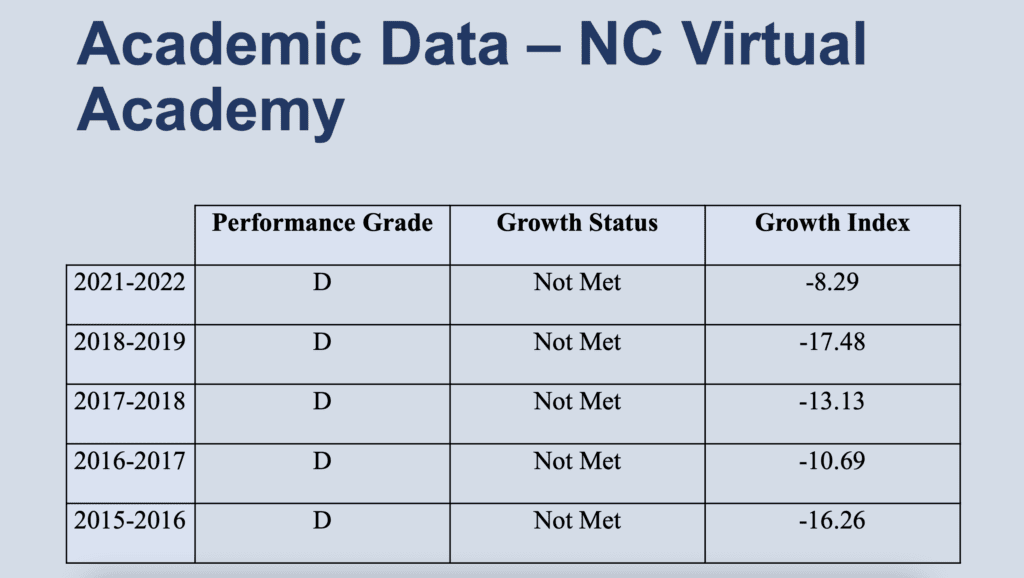
The poor performances extend to nearly every subgroup of student and most subjects.
As a whole, however, the state’s virtual academies — including the virtual charters as well as virtual academies created by districts — performed poorly.
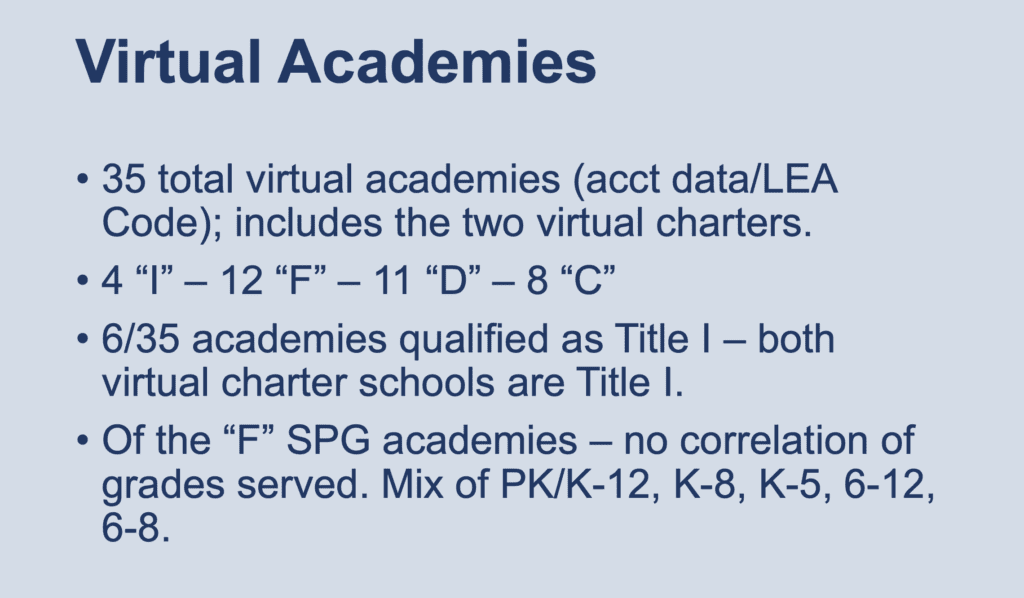
The presentation includes the recommendation that the two virtual charters be taken out of pilot status and put into the standard renewal process for charters.
The data in the presentation was packaged into a report that will go to lawmakers. See the presentation or read the report for more information about the two virtual charters and their performance.
School Performance Grades
State Superintendent Catherine Truitt talked about the state Department of Public Instruction’s (DPI) efforts to redesign the state’s school performance grades. The grades are created using a ratio that emphasizes student’s performance on state exams over their growth in learning. The ratio is 80% academic performance and 20% academic growth.
Truitt said DPI is focusing on changing the grades using multiple units of measurements — rather than just performance and growth.
“We don’t want to look at just those two measurements when we’re talking about school quality,” she said.
The work is being done by DPI’s Office of Innovation. A “multi-sector advisory group” has begun meeting on the topic and will continue to meet monthly.
EducationNC along with DPI launched a survey to get input on school performance grades. Truitt said that more than 15,000 people have responded so far. She said 91% of respondents have agreed that school performance needs to be measured using more metrics than just performance and growth. Take the survey here.
Whatever DPI designs will have to get sign off from lawmakers.
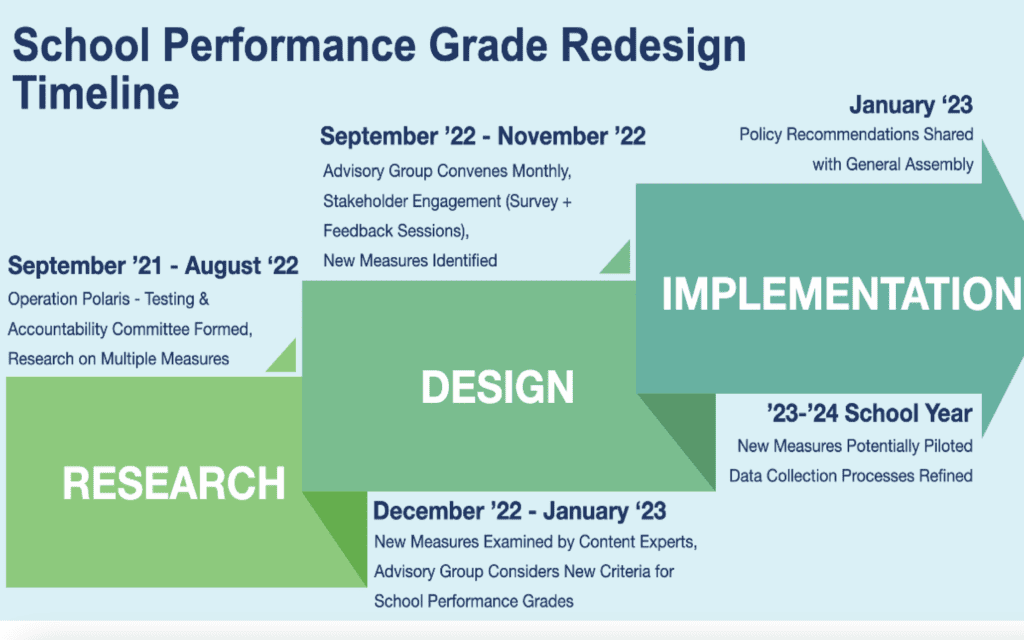
Principal Preparation
The Board voted this week to make various changes to how principals are prepared in the state.
Those changes include:
- Getting rid of a licensure exam as a requirement, and including an evidence-based portfolio as an option.
- Getting rid of the language in statute that requires an internship be “year-long.”
- Requiring four years of work experience as a licensed educator, including teachers as well as support service personnel such as social workers, psychologists, etc.
- Requiring a Master of School Administration. A master’s degree in another area will be accepted if the candidate has done an add-on licensure program related to administration.
There was some discussion about whether the four years of work experience should specifically be classroom work experience.
Staff pointed out that candidates who had four years of work experience not related to classroom teaching have been allowed to become principals for years. There was also a wide ranging argument about whether it was wise to discontinue the testing requirement.
On the first day of the meeting, Board Member James Ford questioned what exactly an exam can tell the state about the quality of a potential principal.
Board Member Amy White said on the second day of the meeting that this isn’t a problem specific to those seeking to become a principal.
“I would suggest that any other professional who has to take an exam would say that exact same argument,” White said in response to the notion raised by Ford.
White said that an exam is the floor as far as potential principal qualifications go.
Superintendent Truitt and Ford argued against leaving an exam as an option, saying it went against all feedback provided DPI by stakeholders on the topic.
Board members argued for a long time on the second day of the meeting before ultimately voting 5-4 to keep the exam as an option, rather than eliminating it altogether. Principal candidates will be able to choose between a portfolio and an exam for licensure. While a test requirement is in state law, the state hasn’t actually had an exam for principal candidates to take in years. One will have to be developed.
In many cases, the changes in principal licensure requirements passed by the Board were an attempt to align state practice with state law.
The changes voted on have to go to the legislature so that lawmakers can make changes to the law.
Career and College Promise
The state instituted a change to the Career and College Promise program designed to increase the number of students who take advantage of it.
The program allows certain high school students to take classes at local community colleges for college credit. A study this summer included a recommendation for “strong and clearly defined partnerships between schools districts and their community college partners,” according to a press release from DPI.
Some districts and community colleges in the state already have agreements that create these kinds of partnerships, but the change voted on by the Board would require these agreements between all school districts and their local community colleges.
Read a press release about the move here.
Long Session Budget
The Board also heard a quick presentation on the timeline leading up to the long session of the General Assembly. The Board will have to decide on what budget priorities members want to advocate for with lawmakers in the biennium budget.
DPI is currently working on coming up with budget recommendations which will go to the Board in November — likely only for discussion — and then in December for a vote.
A revenue forecast for the state won’t be coming out again until around mid-February though. Revenue forecasts for the state have continuously shown revenue surpluses for North Carolina. But Jamey Falkenbury, director of government affairs for Truitt, told Board members that there is a lot of talk about the country heading into recession. So, Board requests may have to be tempered by the possibility that North Carolina won’t have a lot of money to spend, he said.
Truitt, however, pointed out that the Board can always change its budget request if the reality on the ground changes.
Joint Legislative Education Oversight Committee
The Joint Legislative Education Oversight Committee heard presentations on a variety of education subjects during its meeting Wednesday. The topics included a look at how special education is funded and recommendations on how to change that, and the state’s apprenticeship program.
You can see the presentations on those two topics by clicking the title below.
North Carolina Special Education Funding Recommendations Report


